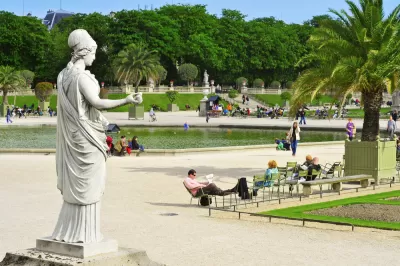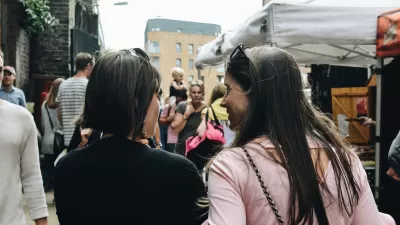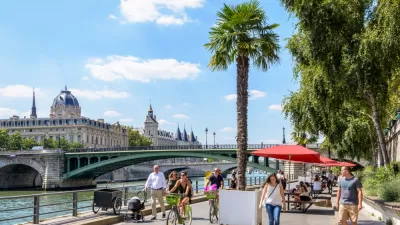Suburban Paris plays host to a disturbing trend: no comfortable public spaces for women, especially for women from immigrant and low-income groups.

Outside of central Paris, public parks, terraces, and cafes are becoming male-only spaces, especially in poorer immigrant communities. For a variety of reasons, from cultural reticence to fears about safety, female citizens no longer feel at home in their own neighborhoods. “This is particularly problematic for those in lower-income brackets, who may not be able to afford going to leisure places which are not free to visit.”
The problem persists in part because many immigrants hail from places where women enjoy less freedom to move about in public. There is nothing to prevent them from visiting public places, but a hostile atmosphere on the street discourages it. In response, groups such as A Place For Women, whose members congregate in public spaces together wearing distinctive scarves, are asserting their right to spend an hour at the park.
Group members argue that infrastructure spending and design are partially to blame. Public spaces for youth are usually designed with male-oriented activities in mind. The trend “persists throughout all the leisure programs organized by municipal bodies: even recreational spending for the elderly goes on petanque (a form of boules), in which women are not regular participants.” The article implies that municipal planners should design parks and recreational facilities to explicitly encourage equal access.
FULL STORY: In France's cities, public space risks becoming a women-free zone

Planetizen Federal Action Tracker
A weekly monitor of how Trump’s orders and actions are impacting planners and planning in America.

Map: Where Senate Republicans Want to Sell Your Public Lands
For public land advocates, the Senate Republicans’ proposal to sell millions of acres of public land in the West is “the biggest fight of their careers.”

Restaurant Patios Were a Pandemic Win — Why Were They so Hard to Keep?
Social distancing requirements and changes in travel patterns prompted cities to pilot new uses for street and sidewalk space. Then it got complicated.

Platform Pilsner: Vancouver Transit Agency Releases... a Beer?
TransLink will receive a portion of every sale of the four-pack.

Toronto Weighs Cheaper Transit, Parking Hikes for Major Events
Special event rates would take effect during large festivals, sports games and concerts to ‘discourage driving, manage congestion and free up space for transit.”

Berlin to Consider Car-Free Zone Larger Than Manhattan
The area bound by the 22-mile Ringbahn would still allow 12 uses of a private automobile per year per person, and several other exemptions.
Urban Design for Planners 1: Software Tools
This six-course series explores essential urban design concepts using open source software and equips planners with the tools they need to participate fully in the urban design process.
Planning for Universal Design
Learn the tools for implementing Universal Design in planning regulations.
Heyer Gruel & Associates PA
JM Goldson LLC
Custer County Colorado
City of Camden Redevelopment Agency
City of Astoria
Transportation Research & Education Center (TREC) at Portland State University
Camden Redevelopment Agency
City of Claremont
Municipality of Princeton (NJ)





























